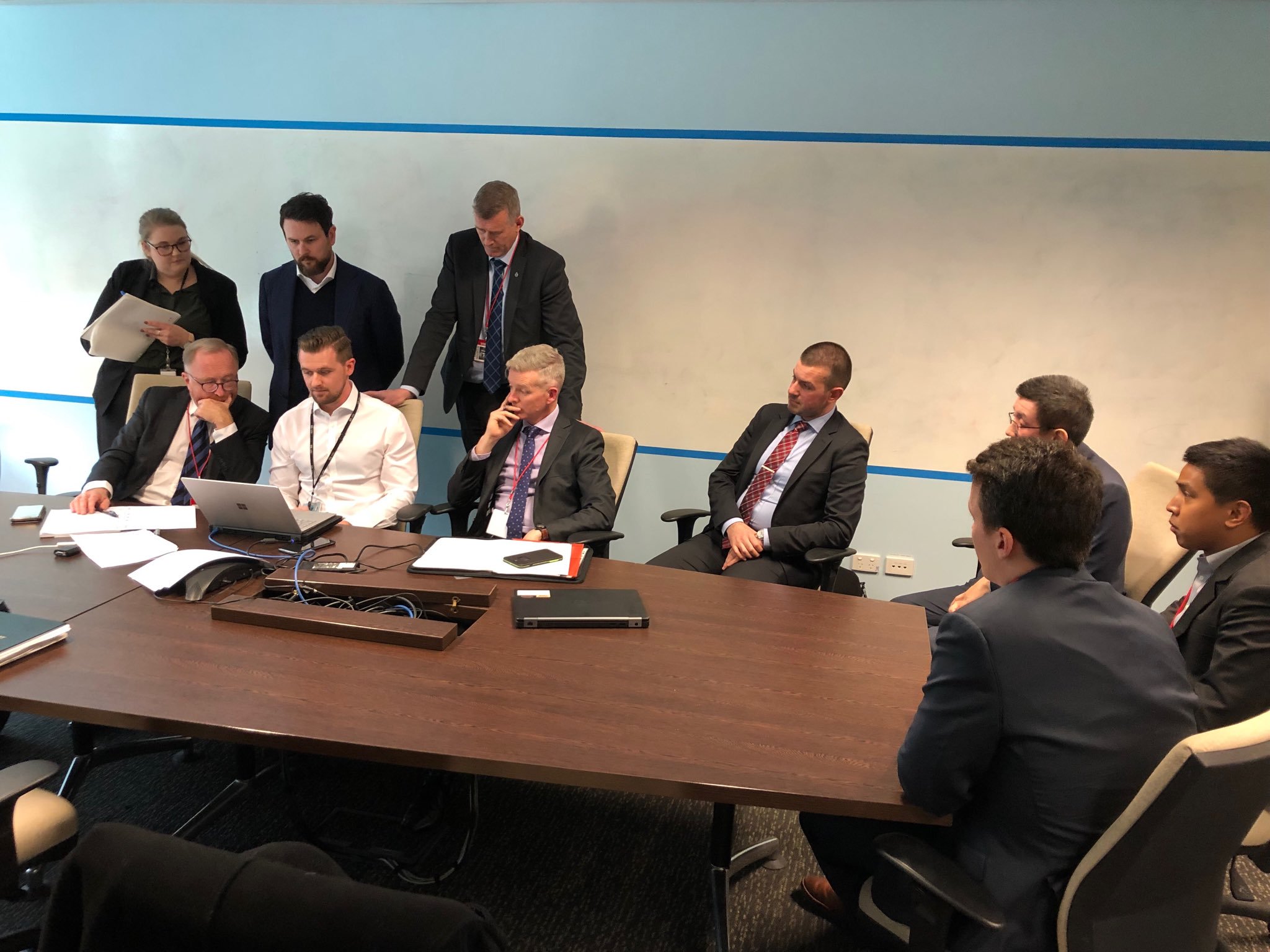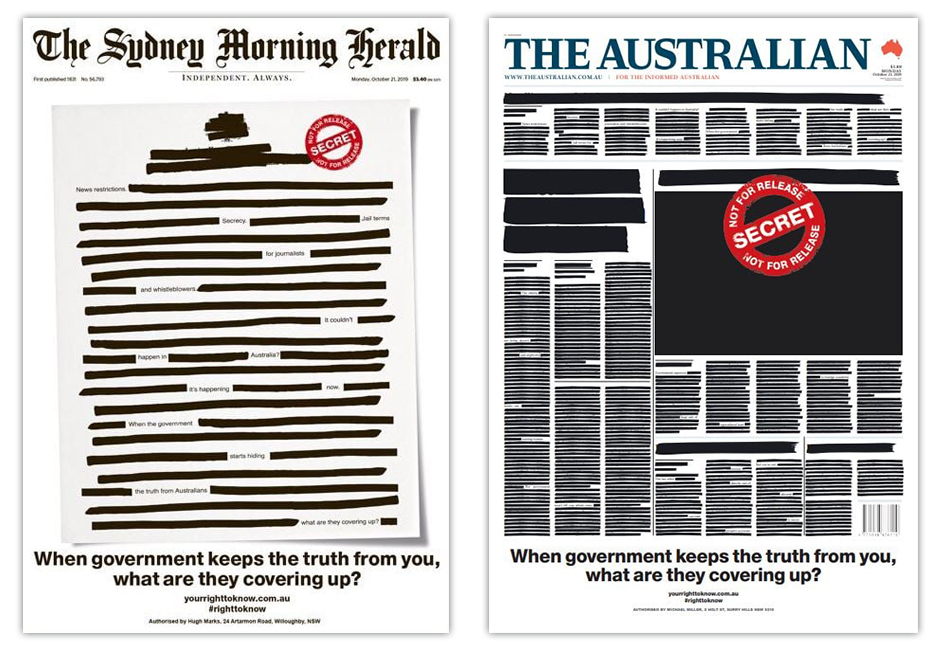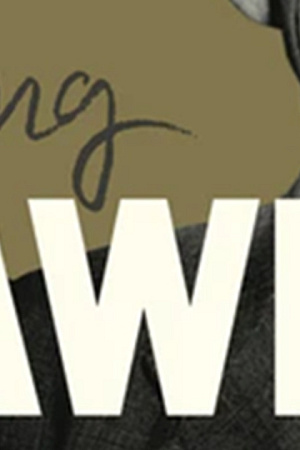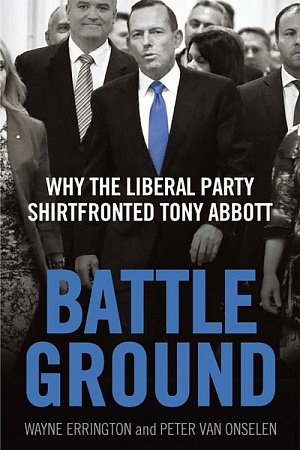The war on journalists and whistleblowers
'It is seldom that liberty of any kind is lost all at once.’
David Hume, 1742
It is a famous parable. If a frog is dropped in boiling water, it will immediately leap out. But if placed in tepid water that is gradually heated, the frog will not notice the increasing temperature until it is boiled alive. The parable may be biologically inaccurate, but it remains instructive in the context of civil liberties. As far back as the Ancient Greeks, Aristotle warned that ‘transgression creeps in unperceived and at last ruins the state’. Societies, the classical philosopher cautions, must ‘guard against the beginning of change’.
When the Australian Federal Police (AFP) arrived at the home of News Corp journalist Annika Smethurst on a crisp Canberra morning in June 2019, the water was warming. The AFP raids, in relation to a story Smethurst had published about intelligence matters, were swiftly condemned; her employer decried them as a ‘dangerous act of intimidation’. A day later, the AFP executed a search warrant at the ABC’s Sydney headquarters, in response to whistleblower-sourced reporting on the conduct of Australian defence personnel in Afghanistan. More public outrage followed. ABC News executive editor John Lyons asked: ‘Is this the new normal?’ Yet the frog was not jumping.
The erosion of government transparency as a result of political action and inaction in distinct but related spheres has led Australian society into hot water. As the federal government has overhauled official secrecy laws, failed to provide robust protection for whistleblowers, cracked down on public servant free speech, and frustrated Freedom of Information (FOI) laws, democratic accountability has suffered.
Because these wounds have been inflicted by a thousand cuts, abetted by weak constitutional protections and courts unwilling or unable to intervene, the impact has not been fully appreciated. Australians neglected to heed the advice offered by American Founding Father James Madison: ‘It is proper to take alarm at the first experiment on our liberties.’ Having failed to do that, we must now ask: is it too late?
 ABC lawyers and AFP officers hover over a computer as they work out what comes within the terms of the warrant. At the end of the table, on the right, are the AFP digital forensics people. (photograph by John Lyons)
ABC lawyers and AFP officers hover over a computer as they work out what comes within the terms of the warrant. At the end of the table, on the right, are the AFP digital forensics people. (photograph by John Lyons)
At 6.04 pm on 7 December 2017, Malcolm Turnbull introduced a new bill into the House of Representatives in Canberra. The attention of onlookers was elsewhere – marriage equality had become law minutes before. Journalists wrote frantically about the momentous development; there was an exodus in the public gallery as activists rejoiced. But while the nation celebrated, Turnbull proposed legislation ‘to counter the threat of foreign states exerting improper influence over our system of government’. Hidden within this bill, and barely mentioned in Turnbull’s subsequent remarks, were the most significant revisions to Australia’s official secrecy laws in a century.
Reform was needed. The relevant provisions of the federal Crimes Act (1914) had been hurriedly legislated following the outbreak of World War I; they were draconian and outdated. In 2009 the apolitical Australian Law Reform Commission (ALRC) published Secrecy Laws and Open Government, an exhaustive 642-page report proposing sensible change. The ALRC sought to reconcile the tension between the necessary role of official secrecy in a Whitehall/Westminster system of government and the centrality of transparency and public accountability in a representative democracy. Its proposals, the ALRC argued, struck ‘a fair balance’ between such competing, and compelling, public interests.
Rather than adopt these considered suggestions, the bill introduced by Turnbull doubled down on the protection of government information. The proposed changes increased tenfold the maximum term of imprisonment for unauthorised disclosures, adopted expansive definitions, and imperilled whistleblowers and journalists.
Civil society pleaded with parliament to amend the draft law. The Human Rights Law Centre condemned the bill as having ‘no place in a healthy democracy’, while Human Rights Watch compared the proposal to measures in ‘repressive countries such as Cambodia and Turkey’. One expert simply described it as ‘creeping Stalinism’. The bill passed in mid-2018, with only minor revision.
✦
Such laws do not operate in a vacuum. Their full impact on government transparency can only be assessed against a broader context. The ALRC recognised this in its 2009 report, highlighting the role of whistleblower protections as an ‘essential element in an effective system of open government and a necessary complement to secrecy laws’. By their nature, secrecy laws prohibit unauthorised disclosure of information – if robust channels are implemented for authorised disclosure, the risk to public accountability by penalising unauthorised leaks is diminished. Here, too, the government has failed to accept informed, apolitical advice.
The concept of whistleblowing has deep roots. The Ancient Greeks celebrated the notion of parrhesia, or fearless speech. The idea that societies should encourage individuals to speak out against wrongdoing has persisted. A seventh-century British king financially incentivised whistleblowing; more than a millennium later, the Civil War-era False Claims Act did much the same in the United States.
Despite these origins, the traumas of the twentieth century saw whistleblowers feared rather than lauded. ‘Snitch’, ‘traitor’, and ‘spy’ remain common synonyms. When South Australia enacted the Whistleblower Protections Act in 1993, it became a world leader, one of the first jurisdictions globally to adopt a stand-alone statute to protect and empower public sector whistleblowers.
Every other Australian state and territory followed suit, but it was not until 2013 that the federal parliament passed the Public Interest Disclosure Act (PID Act) in a rare display of bipartisanship. Notwithstanding the two-decade delay, the PID Act was hailed as a major advance for integrity and transparency in public life. The new law established proper channels for public servants who wished to blow the whistle on fraud, corruption, maladministration, and misconduct within government. It also gave whistleblowers a strong shield against reprisals. The authorised channels for disclosure even included the press, in certain circumstances.
Jubilation at this legislative progress was short-lived. An independent statutory review in mid-2016 was scathing; Philip Moss, in his review, stated that ‘the experience of whistleblowers [under the PID Act] is not a happy one’. In September 2017, a joint parliamentary committee observed that ‘whistleblower protections remain largely theoretical with little practical effect’. Moss articulated thirty-three recommendations for improving the PID Act. Three years later, not a single one has been implemented.
Australia’s ineffective protections for prospective whistleblowers matter because they expose the dissonance at the heart of harsh new official secrecy laws. In a democratic society where public transparency is valued, robust restrictions on unauthorised disclosure of official information could only ever be justifiable if authorised channels alleviate the adverse effect of these limitations.
Official secrecy is not, in itself, a legitimate end. Secrecy is a justifiable pursuit when it serves a compelling public purpose in a proportionate manner. Otherwise, the scales should always be weighted towards openness. As Justice Paul Finn of the Federal Court observed in 2003: ‘The vices of excessive secrecy in the conduct of government, its effect on the quality of public debate and, ultimately, on the practice of democracy itself, have more recently been both exposed and addressed in this country.’
Perhaps no longer. The federal government has instead put the cart before the horse. By on the one hand threatening whistleblowers (and journalists who report their disclosures) with heavy jail sentences, and on the other failing to provide official channels for the same whistleblowers, the executive has created a chilling catch-22. The only winners are those who wish to cloak government operations in a shroud of secrecy.
 21 October 2019: Redacted covers of The Sydney Morning Herald and The Australian, two newspapers of many participating in the Your Right To Know campaign fighting for government transparency.
21 October 2019: Redacted covers of The Sydney Morning Herald and The Australian, two newspapers of many participating in the Your Right To Know campaign fighting for government transparency.
These are two pieces of a broader puzzle. Yet the interrelation between official secrecy, whistleblower protections, and other puzzle pieces has too often been neglected in assessing political developments. Considering these actions and inactions in isolation has been a collective cognitive failure. While each is individually concerning, the severe cumulative impact on public transparency and government accountability has not been appreciated. As Professor Eugene Volokh writes in the Harvard Law Review: ‘We underestimate the importance of gradual changes because our experience teaches us that we needn’t worry much about small changes – but unfortunately this trait sometimes leads us to unwisely ignore a sequence of small changes that aggregate to a large one.’
Another puzzle piece gained attention earlier this year when the High Court ruled against a public servant who had been terminated for tweeting criticisms of government policy via a pseudonym. Michaela Banerji was fired for her political comments in 2013, and subsequently commenced what would become a protracted court battle against her employer, the Department of Immigration. When she won in the Administrative Appeals Tribunal (AAT) in 2018, the Tribunal observed that the termination, in circumstances where there was no visible connection between Banerji’s anonymous tweets and her employment, bore ‘a discomforting resemblance to George Orwell’s thoughtcrime’.
Silencing sixteen per cent of the Australian workforce – approximately the number employed by federal, state, and local government – should have caused the High Court to pause for thought. Instead, in March 2019 the seven judges unanimously gave the government sweeping authorisation to continue its crackdown on employees who dare to speak out, overturning the AAT’s ruling. ‘There can be no doubt,’ the Court held, ‘that the maintenance and protection of an apolitical and professional public service’ is consistent with Australia’s constitution.
Several years ago, the Department of Prime Minister and Cabinet urged public servants to ‘dob in’ their tweeting colleagues, while current guidance from the Australian Public Service Commission warns against even ‘liking’ an anti-government post. Emboldened by the outcome in Banerji, these efforts will no doubt continue.
Combined with harsh secrecy laws and ineffective whistleblowing channels, the High Court’s decision in Banerji erodes transparency and openness in Australian political life. As Justice Finn said in the only Australian case to invalidate Banerji-style limitations, ‘it is not possible to divorce official secrecy from public comment by a public servant, as if the two were in unrelated fields of discourse.’ Otherwise, our society would risk institutionalising a ‘“dialogue of the deaf” between those who do not know and those who will not or cannot tell’.
✦
Lastly, Australia’s FOI regime, an underlying guarantee of transparent government, is being routinely treated with contempt by those it is intended to hold accountable. The relationship between the people and the state in Australia changed profoundly in 1982 with the passage of the Freedom of Information Act at federal level. As Gough Whitlam had argued when first proposing such a law a decade earlier, the aim was ‘a less secret society, a more open society, a more co-operative society, a better informed and involved society’.
In recent years, the law’s noble intentions have been patently ignored. An investigation in January 2019 by The Guardian found that FOI refusals are at record levels, thousands of requests are not being processed within the prescribed timeframe, FOI teams with government departments have shrunk, and the regulator is ‘chronically understaffed’.
The Department of Home Affairs, which receives the most FOI requests, has been accused in the Senate of ‘simply ignoring its obligations in law’. A whistleblower indicated that departments are deliberately delaying the release of documents to minimise embarrassment: ‘In the current age it’s all about managing the message, and FOI is just inconvenient.’ Calls for law reform have been ignored, as has the advice of an independent 2013 review by Allan Hawke, which recommended a comprehensive overhaul.
All the while, there seems little concern on either side of politics about the impact that wilful hostility to open government has on the quality of Australian democracy. The words of a Senate standing committee, opining on draft FOI legislation in 1979, have long been forgotten. ‘Secrecy in government, where excessive or unnecessary, is in fact destructive of the very foundations of a democratic society,’ the committee warned.
This article has highlighted four developments that together represent a grave threat to transparency, and more broadly to press freedom and free speech, in Australia. This list is not exhaustive. A recent parliamentary submission by the Human Rights Law Centre also identified the impact of metadata retention laws, the absence of sufficient safeguards for journalists when warrants are sought, and the ‘maze’ of laws that ‘criminalise some acts of journalism’. A holistic approach to these distinct but related developments is urgently needed. Only then will the true impact be perceptible.
✦
Following the raids, News Corp and the ABC commenced proceedings challenging the respective AFP warrants. The Federal Court heard the ABC’s case in October; News Corp will argue its position before the High Court in November 2019. Somewhat ironically, News Corp’s challenge to the constitutional validity of secrecy laws relates to the pre-reform provisions, as the warrant was granted in early 2018, before the amendments passed.
Even if the media organisations are successful – and recent free-speech litigation offers little optimism – the degradation of public transparency will not be reversed overnight. Limited judicial victories would neither halt the prosecution of Witness K and his lawyer in the East Timor spying case, nor aid Australian Taxation Office whistleblower Richard Boyle, who faces a 161-year prison sentence.
There is no panacea. In response to recent developments, some have demanded a bill of rights. Australia’s lack of explicit constitutional protections for civil liberties makes us an outlier among liberal democracies. Attorney-General Christian Porter recently instructed the Director of Public Prosecutions not to prosecute journalists for official secrecy offences without his (discretionary) approval; Senator Rex Patrick responded by tweeting: ‘Constitutional change is what’s required to properly protect Australian journalists.’
Enshrined human rights might be a helpful step, although the US experience – with its Bill of Rights – suggests this is only a partial remedy. The US treatment of public sector whistleblowers is patchy, and the First Amendment has been missing in action for several decades of Supreme Court jurisprudence on the speech rights of government employees. Only limited progress has been made since 1892, when Justice Oliver Wendell Holmes quipped: ‘The petitioner may have a constitutional right to talk politics, but he has no constitutional right to be a policeman.’
While we await constitutional change (it may be a long wait), Australians should collectively be alert to these creeping, multifaceted threats to our political system. We must all appreciate the bigger picture and resist small intrusions that hinder public accountability. The ongoing parliamentary inquiry into press freedom, due to report in late November 2019, is an important contribution, even if not everyone is so concerned. ‘Is there a crisis around press freedom? No, I don’t think so,’ Home Affairs tsar Mike Pezzullo told the inquiry.
Sure, the frog is still alive. Australia remains a robust liberal democracy, receiving ninety-eight points out of one hundred in the latest Freedom House rankings. But that is no reason for complacency in the face of these gradual encroachments. The AFP raids set off alarm bells around the world; a Pakistani television anchor told The Sydney Morning Herald: ‘It freaked me out. It tells you that no one is safe.’ We should never take our rights and freedoms for granted.
Justice Finn, while on the Federal Court, observed that: ‘Official secrecy has a necessary and proper province in our system of government. A surfeit of secrecy does not.’ By unquestioningly accepting the former explanation as the government pursues its agenda, we have failed to heed his latter warning. Finn’s words are quoted by News Corp as part of its challenge to the AFP raid. We can only hope the High Court is listening.
In Ernest Hemingway’s The Sun Also Rises, Mike Campbell is asked how he went bankrupt. ‘Two ways,’ he quips. ‘Gradually and then suddenly.’ If the current trends continue, Australia will succumb to a surfeit of governmental secrecy, with its corresponding consequences for our civil liberties, slowly and then all at once. And the frog won’t jump.










Comments (2)
The lack of discourse on Assange is disturbing but it is also reflective of the shadowy role Washington plays in everyday Australian life. I think crackdowns on journalists are the price Australia pays for being a part of the Five Eyes spying network. Do we really think that this spineless government would put the society it doesn't even particularly believe in ahead of the corporatocracy bent on holding up the West's power to the bitter end?
We know what we're dealing with now. Assange showed us. Now he languishes in jail on no charge at all, with our care for him erased by a satisfyingly effective rape smear.
#FreeAssange #FreeJournalism
Leave a comment
If you are an ABR subscriber, you will need to sign in to post a comment.
If you have forgotten your sign in details, or if you receive an error message when trying to submit your comment, please email your comment (and the name of the article to which it relates) to ABR Comments. We will review your comment and, subject to approval, we will post it under your name.
Please note that all comments must be approved by ABR and comply with our Terms & Conditions.